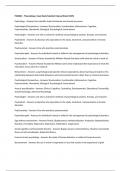FSE2061 - Thanatology Exam Bank Solution Manual Rated 100%
Psychology - Answers the scientific study of behavior and mental processes
Psychological Perspectives - Answers Structuralism, Functionalism, Behaviorism, Cognitive,
Psychoanalytic, Humanistic, Biological, Psychological, Sociocultural
Psychologist - Answers one who is trained in methods of psychological analysis, therapy, and research
Psychiatrist - Answers A physician who specializes in the study, treatment, and prevention of mental
disorders
Psychoanalyst - Answers One who practices psychoanalysis
Psychotherapist - Answers An individual trained or skilled in the management of psychological disorders
Structuralism - Answers A theory founded by Wilhelm Wundt that deals with what the mind Is made of
Functionalism - Answers Mainly founded by William James who emphasized the importance of what the
mind does versus what it is made of.
Behaviorism - Answers a psychological perspective whose explanations about learning are based on the
relationship between observable behaviors and environmental events rather than on internal processes.
Psychological Perspectives - Answers Structuralism, Functionalism, Behaviorism, Cognitive,
Psychoanalytic, Humanistic, Biological, Psychological, Sociocultural
Area of specialization - Answers Clinical, Cognitive, Counseling, Developmental, Educational, Personality,
Social Psychology, Abnormal Psychology
Psychologist - Answers one who is trained in methods of psychological analysis, therapy, and research
Psychiatrist - Answers A physician who specializes in the study, treatment, and prevention of mental
disorders
Psychoanalyst - Answers One who practices psychoanalysis
Psychotherapist - Answers An individual trained or skilled in the management of psychological disorders
Ego defense mechanisms - Answers Denial, Displacement, Intellectualization, Projection, Rationalization,
Reaction, Formation, Regression, Repression, Sublimation, Suppression
Social-cognitive and humanistic theories - Answers Rogers person centered theory, Maslow's humanistic
theory of self-actualization, Existential theory
Funeral service psychology - Answers the study of human behavior as related to funeral service
Bereavement - Answers the act or event of separation or loss that results in the experience of grief
, Mourning - Answers an adjustment process which involves grief or sorrow over a period of time and
helps in the reorganization of the life of an individual following a loss or death of someone beloved
Grief - Answers an emotion or set of emotions due to a loss
Emotions - Answers feelings such as happiness, anger and grief created by brain patterns and bodily
changes
Needs of the Bereaved - Answers Confirm the reality, Express their emotions, Modify emotional ties with
the deceased, Memorialize the person's life, Recognize and complete unfinished business, Receive
emotional support, Be assured feelings are normal, Be accepted for where they are, Establish stability
and security, Provide a basis for building new interpersonal relationships
purposes and values of a funeral ritual - Answers Opportunity to receive and express love, Shows
respect for the family, friends, and the deceased, Opportunity to express grief, Face to face
confrontation with the death, Gain emotional support through sharing, Meet spiritual, psychological,
and social needs, Opportunity for farewell, Reflection and recognition of deceased, Establishes stable
social support network, Establishes socially accepted climate for mourning
Grief syndrome - Answers a set of symptoms associated with loss (Eric Lindemann)
Symptoms of grief syndrome - Answers Somatic or bodily stress of some type, Preoccupation with the
image of the deceased, Guilt relating to the deceased or circumstances of the death, Hostile reaction,
The inability to function as one had before the death
Grief Work (def.) - Answers a process occurring with loss, aimed at loosening the attachment to the
dead for reinvesting in the living.
"The attachment theory" - Answers John Bowlby
Bowlby's Theory of Attachment - Answers describes attachment behavior as any behavior people
develop and maintain that enables them to be close to another individual.
Elizabeth Kubler-Ross - Answers Theorist for the "Five Stages of Death and Dying"
Five Stages of Death and Dying (Kubler-Ross) - Answers Denial and isolation, Anger (def.) - blame
directed at another person, Bargaining, Depression, Acceptance
J. William Worden - Answers Theorist for the "Tasks of Mourning"
Tasks of Mourning - Answers four tasks that the bereaved must go through to successfully manage their
grief: To accept the reality of the loss, To experience the pain of grief and to express emotions
associated with it, To adjust to the environment in which the deceased is missing, To withdraw
emotional energy and reinvest it in another relationship
Grief Counseling - Answers helping people facilitate grief to a healthy completion of the tasks of grieving
within a reasonable time frame.




